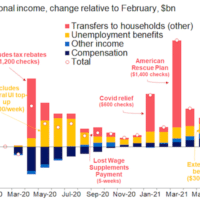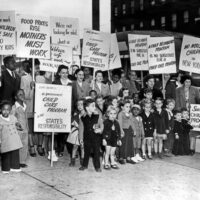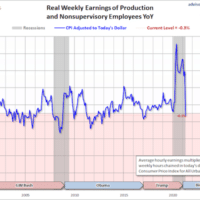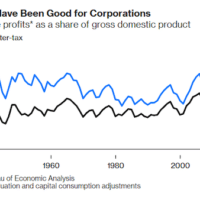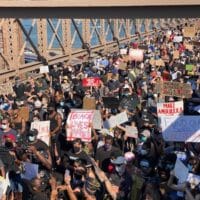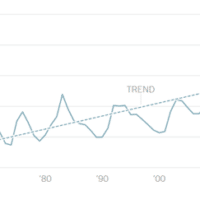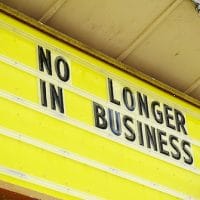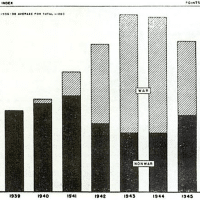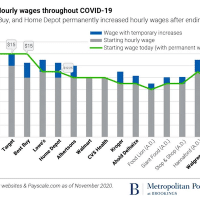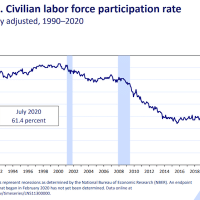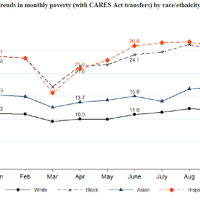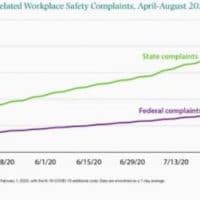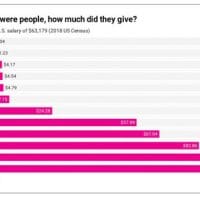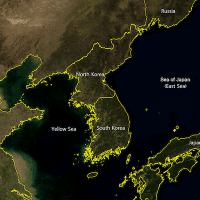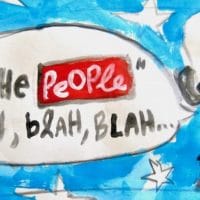-
Pandemic economic woes continue, but so do deep structural problems, especially the long-term growth in the share of low wage jobs
Many are understandably alarmed about what the September 4th termination of several special federal pandemic unemployment insurance programs will mean for millions of workers.
-
Playing the capitalist game: heads they win, tails you lose
According to an Economic Policy Institute report, between 28 and 47 percent of U.S. private sector workers are subject to noncompete agreements.
-
Creating a democratically run economy: lessons from World War II price control struggles*
Many activists in the United States are working to build a movement for a Green New Deal transformation of the economy. Not surprisingly, a growing number look to the World War II conversion of the U.S. economy from civilian to military production for inspiration and policy ideas.
-
Learning from history: community-run child-care centers during World War II
We face many big challenges. And we will need strong, bold policies to meaningfully address them. Solving our child-care crisis is one of those challenges, and a study of World War II government efforts to ensure accessible and affordable high-quality child care points the way to the kind of bold action we need.
-
The latest argument against federal relief: business claims that workers won’t work
In reality there is little support for the argument that expanded unemployment benefits have created an overly worker-friendly labor market, leaving companies unable to hire and, by extension, meet growing demand.
-
Time to put the spotlight on corporate taxes
A battle is slowly brewing in Washington DC over whether to raise corporate taxes to help finance new infrastructure investments.
-
Black Lives Matter protests are saving lives
The research is pretty clear that oppressive economic and social conditions are bad for one’s mental and physical health. And there is also research showing that protesting is good for one’s mental and physical health.
-
The failings of our unemployment insurance system are there by design
Our unemployment insurance system has failed the country at a moment of great need. With tens of millions of workers struggling just to pay rent and buy food, Congress was forced to pass two emergency spending bills, providing one-time stimulus payments, special weekly unemployment insurance payments, and temporary unemployment benefits to those not covered by the system.
-
The U.S. recovery on pause, December brings new job losses
A meaningful working-class recovery from the recession seems far away.
-
The planning and politics of conversion: World War II lessons for a Green New Deal—Part 1
This post highlights the successful government directed wartime reorientation of the U.S. economy from civilian to military production, an achievement that both demonstrates the feasibility of a rapid Green New Deal transformation of the U.S. economy and points to the kinds of organizational capacities we will need to develop.
-
Profits over people: Frontline workers during the pandemic
It wasn’t that long ago that the country celebrated frontline workers by banging pots in the evening to thank them for the risks they took doing their jobs during the pandemic.
-
America’s labor crisis
We face a multifacited labor crisis. One of the most important aspects of this crisis is the U.S. economy’s diminishing capacity to provide employment. This development is highlighted in the chart below, which shows the trend in civilian employment over the last thirty years. Civilian employment includes all individuals who worked at least one hour for […]
-
COVID-19 economic crisis snapshot
Workers in the United States are in the midst of a punishing COVID-19 economic crisis.
-
There is a union difference: mortality rates from COVID-19 are lower in unionized nursing homes
We need strong unions, all of us. Tragically, even during the pandemic, businesses continue to aggressively resist worker attempts at unionization. And recent decisions by the NLRB only add to worker difficulties.
-
Times remain hard, especially for low-wage workers
The current economic crisis has hit workers hard. Unemployment rates remain high, with total weekly initial claims for unemployment insurance benefits continuing to grow.
-
Big tech support for racial justice is more talk than action
In the month following the May 25th death of George Floyd, the largest technology companies collectively pledged more than a billion dollars in support of racial justice. Sounds like a lot of money, but for these companies it is pocket change.
-
The pandemic, technology, and remote work: the corporate push for greater control over workers’ lives
The U.S. economy is undergoing a major transformation largely driven by the coronavirus pandemic. One hallmark of that transformation is the explosion in what is called “remote” work.
-
Seeking peace on the Korean Peninsula
Although the date drew little notice in the U.S. media, July 27, 2020 marked the 67th anniversary of the Korean War Armistice Agreement, an agreement that ended the fighting but not the war between the United States and the Democratic People’s Republic of Korea (North Korea).
-
Defunding police and challenging militarism, a necessary response to their “battle space”
The excessive use of force and killings of unarmed Black Americans by police has fueled a popular movement for slashing police budgets, reimagining policing, and directing freed funds to community-based programs that provide medical and mental health care, housing, and employment support to those in need. This is a long overdue development.
-
Racism, COVID-19, and the fight for economic justice
While the Black Lives Matter protests sweeping the United States were triggered by recent police murders of unarmed African Americans, they are also helping to encourage popular recognition that racism has a long history with punishing consequences for black people that extend beyond policing.

